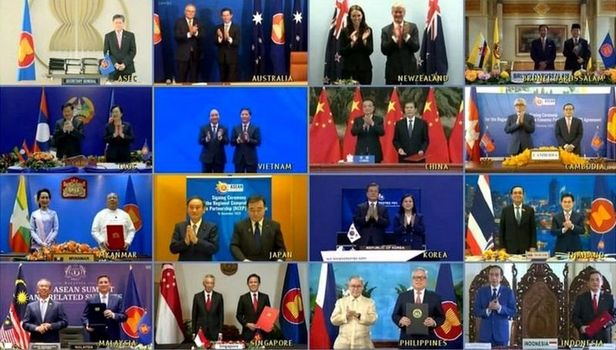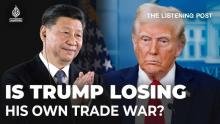RCEP: Why did India not join the world's largest trade deal?
16 Nov 2020 ( IBTN News Bureau )
On 15 November 2020, 15 countries in the Asia-Pacific Ocean region, including China, signed the world's largest trade treaty in Hanoi, Vietnam.
Countries that have joined this trade treaty account for about one-third of the global economy.
The Regional Comprehensive Economic Partnership, or RCEP, has ten countries in Southeast Asia. Apart from these, South Korea, China, Japan, Australia and New Zealand have also joined it.
The US is not involved in this trade-treaty and China is leading it, so most economic analysts see it as a growing influence of China in the region.
This treaty is being said to be bigger than the European Union and the US-Mexico-Canada trade agreement.
Previously, the US was also involved in a trade treaty called the Trans-Pacific Partnership (TPP), but in 2017, shortly after becoming president, Donald Trump had moved the US out of the treaty.
The deal then included 12 countries in the region that also had the support of former US President Barack Obama as they viewed the trade treaty as a response to Chinese-domination.
The negotiations on the RCEP were also underway for the last eight years, which were finally signed on 15 November 2020.
The countries involved in this treaty believe that this will help in improving the situation like the Great Depression caused by the corona virus epidemic.
On this occasion, Vietnam's Prime Minister Nun-Xuan-Fook, describing it as the foundation of the future, said, "Today the RCEP agreement was signed, it is a matter of pride, it is a big step that ASEAN countries are playing a central role in it, And together with the fellow countries, they have established a new relationship that will become stronger in the future. As these countries move towards progress, so will its effect on all countries of the region. ''
According to this new trade treaty, RCEP will abolish customs duties on a variety of goods within the next twenty years. This would include intellectual property, telecommunications, financial services, e-commerce and business services. However, regulations like which country a product originated in may have some effect but in countries that are part of the treaty, there is already agreement on free-trade among many countries.
With this trade treaty, China's influence in the region has deepened.
India not included in RCEP
India is not a part of this treaty. India was also involved in the RCEP at the time of bargaining, but India was separated from it last year. The Government of India had then said that this would lead to a flood of cheap Chinese goods in the country and it would be difficult for small scale manufacturing traders in India to deliver goods at a price that would increase their troubles.
But on 15 November 2020, ASEAN countries who joined the treaty said that 'the gates will remain open for India, if in future India can join RCEP'.
The question arises that what can be the effect on India not being part of this trade group? To understand this, BBC correspondent Faisal Mohammed Ali spoke to India-China business affairs expert Santosh Pai.
He said, "RCEP has a membership of 15 countries. About 30 percent of the world's construction industry is from these countries. In such a situation, such free-trade agreements are very important for India, because India can explore many new possibilities of trade through them. ''
"Like India is inviting many countries to come and invest in the construction industry, so they also attract such agreements, but if India is not in it, then it becomes a question that they should come to India How to get promoted? "
"The second thing is that the buying capacity of consumers in India is increasing, but compared to the international level, it is still very low. If a foreign company has to come and manufacture in India, then also to export it Much care has to be taken because it is consumed in the domestic market of India, it seems a bit difficult. "
At one time India, along with countries like Japan and Australia, wanted to reduce dependence on China. But now those countries are involved in it and India is different from it. What is the reason for this?
To this Santosh Pai said, "How much India can reduce 'dependence on China', it will not be seen in six-seven months, but in five years, it will show its full effect. Only then will know how much India has Seriously it did. The rest of the countries have been trying to reduce their dependence on China for many years, and that is why these countries do not want to stay out of the RCEP because they know that by staying inside it 'Can better reduce dependence on China'. "
He said, "Apart from China, there are many strong countries in RCEP which have excellent work in many fields (like electronics and automobiles). But India's problem is that till last year, India was trying a lot to increase sugar trade more and more. How to increase more and attract Chinese investment more and more?''
India had a target of $ 100 billion in terms of trade with China. But in the last six months, the situation has changed completely due to political reasons. Now the Indian government has started a self-reliance campaign which aims to reduce trade with China and limit Chinese investment as well.
In the end, Pai said, "Even if the 'self-reliance campaign' was taken seriously, it would take years to get its effect. So it would be too early to say anything now.''
(Click here for Android APP of IBTN. You can follow us on facebook and Twitter)
Share This News
About sharing
-
 19 Apr 2025
Meme warfare in Trump’s battle with Beijing
19 Apr 2025
Meme warfare in Trump’s battle with Beijing
Meme warfare in Trump’s battle with Beijing
Saturday, Apr ...
-
 11 Apr 2025
Gaza is a post-apocalyptic killing zone: UNRWA chief Philippe Lazzarini
11 Apr 2025
Gaza is a post-apocalyptic killing zone: UNRWA chief Philippe Lazzarini
Gaza is a post-apocalyptic killing zone: UNRWA chief Philippe Lazzarini
-
 11 Apr 2025
Ralph Wilde on the ICJ & why Israeli occupation must end?
11 Apr 2025
Ralph Wilde on the ICJ & why Israeli occupation must end?
Ralph Wilde on the ICJ & why Israeli occupation must end?
Fr...
-
 10 Apr 2025
Can Europeans alone change the course of Russia's war in Ukraine?
10 Apr 2025
Can Europeans alone change the course of Russia's war in Ukraine?
Can Europeans alone change the course of Russia's war in Ukraine?
... -
 10 Apr 2025
What is behind Trump's U-turn on tariffs?
10 Apr 2025
What is behind Trump's U-turn on tariffs?
What is behind Trump's U-turn on tariffs?
Thursday, Apr 10, ...



